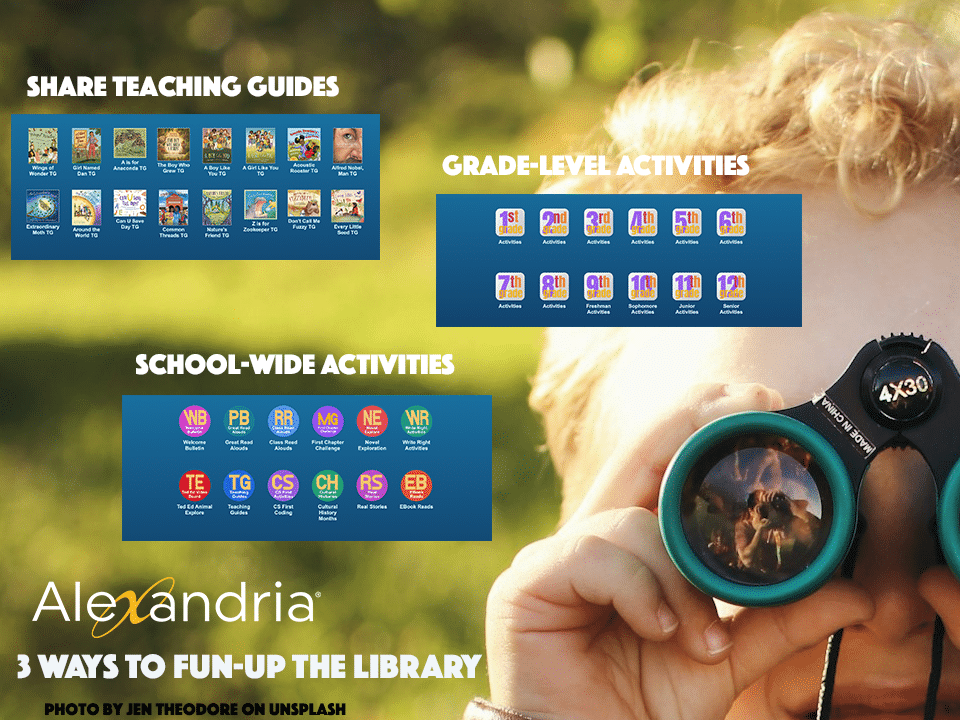
How to Start a Book Club
September 26, 2023
Unlock Student Success: How Librarians Utilize ALEX to Collaborate with Teachers
November 18, 2023Navigating the Shelves: 8 Tips for First-Time Librarians

HOW MAY WE HELP YOU? We wanted to help new librarians, learn a little mor about librarianship, and hear from librarians in the field, so we asked a few to share their secrets to surviving as a first year librarian. What are the biggest concerns for those new to librarianship and how can we help them focus on what is most important? Here’s what they shared.
1
How were you introduced to the idea of starting a career as a librarian?
Mrs. Sanders from Nebraska writes, The position kind of fell into my lap. I had a different job in my school district and a principal asked me to apply for the elementary librarian opening. Two years later, here I am!
James Allen, Statewide School Library Lead, Kentucky Department of Education writes, I was introduced to librarianship as a career option in college. I worked part-time in my university's library and saw first-hand the positive impact that librarians had on helping students succeed in their research and studies. I was drawn to the intellectual challenge of connecting people with information, as well as the opportunity to continually learn about new resources and technologies. The librarians I worked with became mentors and encouraged me to pursue an MLIS degree.
Alma Medina, Retired Texas Elementary School Librarian, Sales Executive with COMPanion Corporation. writes, Since I was a child, I spent much time reading. I love organizing things as well. I also love working with people. Through my educational years, I quickly arrived to the conclusion that the services a librarian provides includes them all.
LET'S ASK ALEX:
Thank you for sharing Mrs. Sanders, James, and Alma. It seems that the pathway to librarianship is wide and varied, but there are certain personality traits that stand out. There are common threads in your responses.
Ten (10) traits the most respected librarians share?
1) They value people. The best librarians don't worry about lost books, but care for patrons and relationships and above rules.
2) They take ownership. They hold a vision for the library program and make the library itself part of that vision for all library stakeholders.
3) They are respected communicators. Librarians are transparent about how their time and budgets are spent and advocate by sharing the excitement about library events.
4) They are collaborators. Librarians love working with others: other librarians, teachers, building committees, curriculum leaders, parent organizations to target school success.
5) They are flexible program evaluators. Librarians know and understand state and national library standards, but tailor these to meet the specific needs of their districts and communities.
6) They are welcoming. Librarians create a welcoming gathering place filled with comfort, safety, and cozy furniture for patrons.
7) They empower others. They are natural-born teachers who enjoy helping others develop life-long skills in reading, technology, research, and problem-solving.
8) They know lit and tech. The best librarians are children's and YA literature meets tech guru. They use technology to communicate, embrace a love of kid lit, and find powerful ways to combine the two.
9) They place kids first. They build relationships with readers and encourage the joy of reading first and foremost.
10) They are mission-driven. A great librarian is purpose driven, and realize that courage and confidence is a necessary dance for successful students.
2
What is most important in preparing for success in our profession?
Mrs. Sanders from Nebraska: I’m more prepared than some simply because I’ve been using libraries my whole life and I’ve been an avid reader my whole life. I’m also now getting my masters in curriculum and instruction with an emphasis in library and media studies.
James Allen, Statewide School Library Lead, Kentucky Department of Education: In preparing for success as a librarian, developing strong research, technology, and instructional skills are essential. But just as important is cultivating curiosity, empathy, and a service mindset. Librarianship is fundamentally about helping people grow through knowledge. Being able to listen to patrons, understand their needs, and then connect them with the best resources requires interpersonal aptitude. A passion for lifelong learning is also key to staying current in the profession.
Alma Medina, Retired Texas Elementary School Librarian, Sales Executive with COMPanion Corporation: In preparation for success in the librarian profession, I believe that it is most important to understand all the purposes someone would have for libraries and be knowledgeable of all the different types of resources people would use in a library. If your career will be in a school setting, you would be best prepared if you acquire a teaching degree as well so you are very familiar with curriculum needs and can develop ways to increase teacher-librarian collaboration.
LET'S ASK ALEX:
Thank you for sharing, Everyone. It certainly stand to reason that a love of reading tops the list for prepping success as a librarian. Knowing kid lit, reading kid lit, and really sharing a love of books is what brings most librarian to the profession. Sharing the best of the best books in a way that makes it super user-friendly and patron-easy, and then streamline efficiencies: add self checkouts for each school, drop decimals on Dewey, serialize your collection. Then, focus your attention on engaging kids with the literature, reclassify, use dynamic shelving, and the kids will explore and engage.
This is well put, James: "In preparing for success as a librarian, developing strong research, technology, and instructional skills are essential. But just as important is cultivating curiosity, empathy, and a service mindset." You've certainly nailed it here. Let's explore this further.
Top three (3) traits that ensure a librarian's success?
1) Cultivating curiosity. Librarians are first great and avid readers and second motivators. When you can helps kids tap into their interest—what they are most curious about, good things happen. An the librarian is a nurturer of collective curiosities because they place care as a primary ideal when helping patrons become lifelong learners.
2) Empathy and Engagement. When we think of the libraries of old, we think of eyeglass maidens wearing a permanent Shh! sign. But not anymore. Today's librarian will use the library as a premium learning tool. She will embrace her library and all the tools around her as a means to getting under the skin of unsuspecting patrons. How will she instill a love of art? She will pull directly from her 740 Dewey and pull out all the books on drawing and sketching and creating and unite it with paper and hand it over to student and invide play. She will pull 740 Origami books and paper, and say, Try. She will hand out a different Science Comic to each table and host an investigation: what topic, what's most interesting—please teach me, share with me.
3) Service Mindset. All three librarians who responded here mentioned liking to organize and share and serve others. That is what librarians do. They find the books they love, order the best of the best, and gift them out to be read and read and read onward until their life on the shelf ends and minds and hearts have been touched forevermore.
3
What are the key responsibilities and functions of librarians?
Mrs. Sanders from Nebraska: Key responsibilities are keeping the library organized and updated. Teaching students how to utilize the library for fun and learning. Engaging the community. Doing their best to keep the love of books alive. (And start those sparks.)
James Allen, Statewide School Library Lead, Kentucky Department of Education: Librarians fill several important roles. As information experts, they specialize in finding, evaluating, and organizing information resources. As educators, they teach information literacy skills and promote learning. As technology leaders, they manage systems and tools for accessing and distributing information. As community builders, they create welcoming spaces and programming that bring people together. But the librarian's overarching purpose is to provide equitable access to information that enlightens, empowers, and elevates their community of readers.
Alma Medina, Retired Texas Elementary School Librarian, Sales Executive with COMPanion Corporation: A key responsibility would be to offer a quality, diverse collection of materials for patrons to utilize for leisure reading, research, and gaining knowledge. Another key responsibility would be to instill the love for reading and valuing books in patrons. As technology further emerges into librarianship, another key responsibility would be to utilize software and offer software programs to patrons.
LET'S ASK ALEX:
Thank you for sharing, Everyone. Mrs. Sander's gets it right: "Key responsibilities are keeping the library organized and updated. Teaching students how to utilize the library for fun and learning. " But let's also explore what Alma mentions here: "As technology further emerges into librarianship, another key responsibility would be to utilize software and offer software programs to patrons."
What 4 things can I look for in my Library Software that would help me inspire readers?
1) Sharing Slideshows. Share slideshows you can create in 30 seconds or less, compile a whole set of 16 or more, and have them at the ready for any aged reader at any given moment. Wow! What a time saver!
2) Build Bulletin Boards. Build book experiences in your library that enhance the physical space AND extend out to community virtually. Create a first page bulletin. Build a Book Club event. Share a Themed Stories Bulletin and be able to email it home or send it to all teachers using a single URL.
3) Create Endless Explore Panes. In Alex, explore panes are a great way to share new ways to interact with your library. You can create panes to share books by lexile levels or AR levels, or share teacher guides or series titles or videos or coding activities or online games—so this is one easy, easy way to expand a libraries services in a snap. Simply think about what students, academics, and public library patrons might need and deliver.
4) Link to Curriculum. Use Alex's OTHER tab to expand book experiences. Link to a video or trailer or reading or game the author shares online or link to the author's website—or, if you are an AR school, link to a quiz. The possibilities are endless and every effort makes your patron's library experience ever better.
4
What were your educational and training requirements?
Alma Medina, Retired Texas Elementary School Librarian, Sales Executive with COMPanion Corporation: As part of my professional development, I acquired a Bachelor Degree in Elementary Education with a minor in English, a certification in Bilingual Education, and a certification in Library Information Science. To increase my knowledge in technology applications, I completed school district training on various softwares and programs, completed Google online courses, and attended various library conferences and technology conferences.
LET'S ASK ALEX:
Thank you for sharing your experiences. In a few facebook groups, it was easy to identify disparity among programs and expectations when it comes to entering the library profession. One professional mentioned already holding her MLIS and she was bring asked to go back to school for School Librarian Licensure. That is brain-tangling when the next thing you read is that in another state, all they needed was to have Elementary licensure and pass the Library exam. Finally, another group member summed it up well: "It depends on the state." But should it?
What 4 focus areas for most academic programs that prep students for work as a librarian?
1) Children's Literature. Typically, there's a course that focuses on young adult literature and another that focuses on children's lit, which includes board books through middle grades.
2) Finding, Organizing, & Using Information. Finding and using resources to help patrons, how to identify source bias and more.
3) Technology, Virtual Libraries & Curriculum Design. The ability to work on the tech-side, library platform, student devices and more as well as the ability to design courses that teach the library standards.
4) Library Administration. Our local librarian mentioned that working in a small-town library was a lot like being the HR, Marketing Manager, and Librarian, all rolled into one and that just about shares the library admin course.
5
What are some tips for landing your first librarian job: What would help you stand out as a new applicant?
Alma Medina, Retired Texas Elementary School Librarian, Sales Executive with COMPanion Corporation: If you are applying for a library position in a school, learn the campus plans/goals and get familiar with the programs that are already in place. Then, offer ways in which you can tie-in your library program to the school’s campus plans/goals in order to make the library an integral part of the overall school system.
LET'S ASK ALEX:
Thank you for sharing your experiences, Alma. I love that you mentioned how important it is to "offer ways in which you can tie-in your library program to the school’s campus plans/goals in order to make the library an integral part of the overall school system." It's vital to share your vision as a library profession.
Here are 5 tips to help you navigate your first librarian interview?
1) Share and assess both strengths and weaknesses. There's always a question about sharing strengths and weaknesses and what your are doing to improve on these.
2) Show you problem-solving and critical thinking. Librarians problem-solve ever. single. day. So, share how you problem-solve challenges and use critical thinking to further district or library goals.
3) Showcase your knowledge of the profession. Showcase knowledge of book and authors/illustrators, your ideas on how to further the library's mission, and how this benefits the stakeholders.
4) Highlight self-awareness and leadership. In most Leadership courses, students share their leadership style. Here's the perfect time to dust off the results you discovered and share how becoming more self-aware improved your leadership role.
5) Tell stories that attest to your initiative and collaboration. Share how you went above and beyond on he job, like the time you spent the summer reclassifying a library to improve reading and how you worked with others to make it happen, from planning to completion.
6
How might you build professional relationships and handle networking, community, colleagues, and patrons?
Alma Medina, Retired Texas Elementary School Librarian, Sales Executive with COMPanion Corporation: A good way to build professional relationships is to be present. Become a member of committees or establish your own library-related club/committee.
LET'S ASK ALEX:
Thanks you, Alma! Librarians do build relationships and network by attending library and information science (LIS) conferences, seminars, and workshops to meet other professionals. They might also participate in online discussion groups/forums, professional associations, and social media platforms to connect with colleagues, librarians, and professionals. They might join library consortia, regional association, and other cooperatives to share resources and ideas.
Here are 5 tips to help you navigate your first librarian interview?
1) Establish your own library-related club. Create a Library Educators Club at school, public library, or collegiate library and shoulder the work to put out book-loving games and challenges.
2) Join other professional associations. Join ALA, NCTE, AASL (and so many more) and great facebook groups.
3) Promote and share an online presence. Have fun sharing book joy on Instagram, Pinterest, TikTok, Facebook, et all.
Attend and present at library-reading events. Join in. Share. Live library-wide. A book begins a conversation and librarians continue and stretch those conversations and learning experiences.
Seek a mentorship and get feedback. Connect and create your community, one that allows you to grow and improve and better serve patrons.
Engage in lifelong learning and professional development. Learn your library ILS, bridge to technology and if you do not know something, be willing to grow and learn.
Contribute to the professional library community. Library is community, so become involved and do more, share, and build. That is the beauty of libraries.
7
What are the challenges and time management tips for maintaining work-life balance?
Alma Medina, Retired Texas Elementary School Librarian, Sales Executive with COMPanion Corporation: With technology emerging more and more, it is difficult to keep work and personal life separate. One way I managed that was by not linking my work emails to my cell phone. I handled work emails from my computers only. My administrators knew they could reach me by phone or text if there was an emergency.
LET'S ASK ALEX:
Thank you, Alma. There's more pressure than ever to do many things, for sure. So often, even librarians who oversee more than one school (an elementary and middle school for example) also teach classes, see all students, help for lunch duty—and this makes juggle multiple tasks at once mandatory. Implementing time management strategies can help achieve a better work-life balance versus feeling like the octopus with far too many tentacles working all at once. Let's face it, when it comes to library, there are tons of surprises and as much to celebrate.
What 7 tips do we recommend you use to bring balance to your day?
1) Prioritize tasks: Identifying the most important and urgent tasks daily, completing these tasks first, and then move on.
2) Set boundaries: Establish clear boundaries, as Alma suggests, between work and personal life and avoid taking work home. When at home, relax and respect your time.
3) Delegate and collaborate: Identify tasks that can be shared, ways to collaborate, and streamline efficiencies.
4) Learn to say no: Be comfortable saying no to additional tasks or responsibilities when necessary.
5) Use technology and tools: Utilize technology and streamline or automate certain tasks.
6) Take breaks and prioritize self-care: Allow yourself regular breaks and engage in activities that reduce stress and promote well-being.
7) Seek support and resources: Reach out to colleagues, professional networks, or attend workshops and conferences to stay up-to-date on books and trends and ways to better engage readers.
8
What are common challenges faced by first-time librarians, how do you overcome them, and stay motivated?
Alma Medina, Retired Texas Elementary School Librarian, Sales Executive with COMPanion Corporation: One common challenge is that not everyone sees libraries as essential. There are even campus principals that don’t see libraries as educational hubs. Librarians in these campuses have to continually prove their importance and advocate for their budget and support staff. I was very fortunate to work with principals who valued the library and kept the library as the learning hub of the school. My main goal was to keep a positive relationship with my principal and always answer her requests to support campus goals, make efforts to increase test scores, and offer programs that support the curriculum focus as it changes year to year.
LET'S ASK ALEX:
Yes, Alma. We are definitely facing a crisis with even districts not seeing the library as essential. Classroom libraries are being used instead of libraries, visits are falling off the schedules, and some libraries are turning into behavior centers—or worse, closing all together.
What 4 things can first-timers do to identify and overcome challenges?
The most common challenges and how you might book yourself a survival flight:
1) Lack of experience: New librarians may feel overwhelmed by all that is required in their new role, but attending workshops, conferences, and webinars will enhance skills and help you gain new knowledge.
2) Building relationships: Connect with fellow librarians, public and online, to share experiences, seek advice, and collaborate with peers. Find a mentor within the library field who can offer guidance and support.
3) Technology integration: Librarian must know tech, embrace digital technologies, and adapting to new technology can be daunting for new librarians. Those who seek out training as a tech guru will overcome this challenge.
4) Balancing multiple responsibilities: Librarians have so many responsibilities including cataloging, collection development, public service, and outreach. So those who prioritize and break down big tasks into smaller, manageable goals, and celebrate milestones can provide a sense of accomplishment and motivate the next step toward success.




